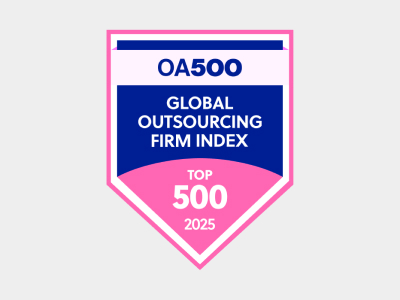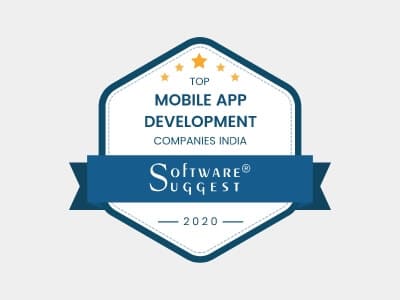Artificial Intelligence is swiftly transforming every industry sector – from streamlining business operations to assisting customers with hyper-personalization in enhancing shopping experience. Through highly accurate recommendation algorithms, artificial intelligence has penetrated every single venture irrespective of its size and type.
Artificial Intelligence – the dawn of Industry 4.0

Source: FinancesOnline
Businesses are getting immense benefits from the superpower of Artificial Intelligence as they can now analyze enormous amounts of data to read between hidden patterns and automate repetitive tasks with accuracy. Business operations and processes, with the help of AI, are optimized with peak efficiency today and this is only growing in a positive direction. The future of AI is even promising as it will be the most essential tool for any business, supported by compelling AI statistics that highlight its transformative impact.
AI assistants today can enhance medical diagnoses and drive cars plus they can manage complex supply chains and offer real-time customer support 24/7 tirelessly. From multi-lingual communication to translation and data-driven marketing campaigns based on customer behavior, Artificial Intelligence is the thing without which businesses of the modern age won’t survive for longer.
CXOs – the early adopters
When artificial intelligence has made its way into almost every industry sector, its adoption in building customized software solutions on mobile and web technologies has grown manifold. IBM’s article on AI code-generation software mentions three primary benefits of using AI in the IT industry:
- AI saves time as it enables developers to write code faster and reduces the work of manually writing lines of code. This frees up developers to focus on higher-value work.
- IT agencies have adopted Generative AI (GenAI) to quickly and efficiently test and debug codes.
- In other cases, using generative AI for code also makes programming accessible and understandable to non-developers.
CXOs face ever-growing data and complex security challenges in their businesses, and they need the powerful support that AI provides. The C-Suite executives in IT agencies are adopting AI as their strategic tool to transform the way IT agencies operate and function. They use AI power beyond reactive measures as CXOs use the technology to predict equipment failures even before they occur, keeping costly downtime and maintenance at bay.
For software development, IT agencies are using AI-powered technologies, tools, and frameworks to automate their coding and parsing. Thus, CXOs of tech companies have been early adopters of utilizing the best of AI to make their businesses more proactive, secure, and efficient.
WeblineIndia grabbed an opportunity to gauge CXO sentiments on Artificial Intelligence. We employed a multifaceted approach to contact them and ask for their valuable opinions. After conducting in-depth interviews and leveraging our age-old business relationships, we asked for any specific challenges and their potential AI applications. An esteemed CEO and domain expert Adam Hempenstall shared his experience with us:

Adam Hempenstall, CEO of Better Proposals, strongly opposes AI for customer interactions, viewing it as unethical. He credits this stance with building customer loyalty and industry respect. Despite recognizing AI’s potential, he advocates for its limited use, reserving tasks like art for humans. At Better Proposals, AI is tightly controlled, used only for simple code and basic queries, ensuring authenticity and accuracy, especially in hiring practices.
The other targeted surveys got us a broader and useful perspectives from the C-suite executives who are the driving force behind esteemed companies. This multi-pronged strategy of using AI yielded their companies a transformation much needed in today’s cyberage. With these opinions straight from the helmsmen of highly reputed companies will help other executives to adopt AI’s transformative potential.
Prediction for AI in the next 5-10 years
The future of software development with AI is brighter and more fruitful. The technology will revolutionize how IT agencies will build customized software solutions on mobile and web technologies. AI will be developers’ best companion to analyze existing code, generate code snippets, and even functionalities. IT agencies will adopt AI to automate repetitive tasks and propel software development at a pace.
AI-powered software will become more adaptable as it’ll learn and evolve from user behavior and data which will result in a more intuitive user experience. Software built with AI and ML models will refine itself based on user interactions. CXOs are aiming to utilize AI’s capabilities for reduced development time and costs.
The future of AI in the software industry is also anticipated to lower development burdens through automated coding and testing. Developers, with the help of AI tools, will effectively solve problems by applying logic and strategic thinking. In brief, the AI future promises more efficient and innovative mobile and web app development with way more efficiency, pace, safety, and accuracy.
Here are a few future AI trends in the IT industry, along with references and sources:
- Generative AI: AI models that create new content (text, images, code) are becoming increasingly sophisticated. This will revolutionize content creation, software development, and even design. Source: Synthesia – 8 AI Trends To Look Out For in 2024
- Multimodal AI: AI that understands and processes information from multiple sources (text, images, video) will enable more natural and intuitive human-computer interaction. Source: IBM Blog – The most important AI trends in 2024
- AI-Driven Cybersecurity: AI will play a crucial role in detecting and responding to cyber threats, helping organizations stay ahead of increasingly sophisticated attacks. Source: devabit – 11 New Technologies in AI: All Trends of 2023-2024
- AI-Powered Automation: AI will automate more complex tasks, improving efficiency and productivity across various IT operations, from infrastructure management to software testing. Source: Future Trends of Artificial Intelligence (AI)
- AIOps (Artificial Intelligence for IT Operations): AI will be integrated into IT operations to automate incident response, predict failures, and optimize performance. Source: Gartner – Top Strategic Technology Trends for 2023
- Explainable AI (XAI): As AI systems become more complex, there will be a growing demand for transparency and interpretability to ensure trust and accountability. Source: DARPA – Explainable Artificial Intelligence (XAI) Program

Our beloved CEO Steve Austins puts some light on the topic:
For the popularity and rise of AI, Steve Austins opines that emerging AI technologies, particularly in voice replication, are set to revolutionize podcasting by enabling smooth revoicing and fully AI-voiced scripts, benefiting small and international companies. AI will also transform business processes by accelerating routine tasks and providing strategic decision-making support, making human involvement in these areas seem obsolete.
Opportunities and benefits of AI
Artificial Intelligence (AI) presents a transformative opportunity for IT agencies to enhance their business operations and drive growth in non-technical departments. In administration, AI can streamline complex workflows, automate routine tasks, and optimize resource allocation, leading to increased efficiency and cost savings. Management can leverage AI for predictive analytics, enabling data-driven decision-making and strategic planning. This foresight can identify potential market shifts and operational improvements.
In sales, AI tools can analyze customer data to personalize marketing efforts, predict purchasing trends, and improve customer service, potentially boosting sales figures. Overall, AI is poised to add significant value across various facets of IT businesses, from operational agility to customer engagement and revenue generation. Agencies that embrace AI stand to gain a competitive edge in an increasingly digital marketplace.
The C-level executives of IT agencies are increasingly recognizing the strategic value of AI in driving business success. A recent survey by GitLab highlighted that while there are mixed sentiments regarding AI, a significant portion of CXOs are optimistic about its integration into their operations. They acknowledge AI’s potential to accelerate software development and enhance developer productivity, which is crucial for business growth.
Another report emphasizes that AI-driven decision-making is a game-changer, offering CXOs data-driven insights for better strategic planning and execution. Moreover, strategies for scaling AI effectively within organizations suggest that CXOs are focused on maximizing value across all stakeholders. This positive outlook is pivotal as it underscores the commitment of IT agency leaders to harness AI’s transformative power responsibly and ethically, ensuring a competitive edge in the digital landscape.
We have an expert’s opinion:

Fabrizio Degni views AI as a transformative force in business and technology, enhancing productivity and forecasting abilities. While the evaluation of AI’s ROI and success through KPIs is in progress, insights on workforce upskilling from HR could prove to be a crucial metric for gauging AI’s impact.
Challenges and risks for AI-powered IT agencies
AI-powered IT agencies are at the forefront of technological innovation, but this position comes with a complex array of challenges and risks that must be managed with care and foresight. Ethical considerations are paramount, as AI systems can inadvertently perpetuate biases present in their training data, leading to discriminatory outcomes. This necessitates a rigorous approach to data management and a commitment to ethical AI practices.
Over-reliance
The risk of over-reliance on AI is another significant concern. While AI can enhance efficiency and decision-making, over-dependence can erode critical human skills and judgment. It’s essential for agencies to maintain a balance between AI and human input, ensuring that the human workforce remains engaged and capable of intervening when necessary.
Cybersecurity
Cybersecurity threats pose a substantial risk to AI-powered IT agencies. As AI systems become more deeply embedded in organizational infrastructure, they become prime targets for cyberattacks. These attacks can compromise sensitive data and disrupt operations, leading to financial and reputational damage. Agencies must invest in robust cybersecurity measures to protect against such threats.
Keeping pace
Keeping pace with the rapid development of AI technology is a challenge. The field evolves at a breakneck speed, and agencies must ensure their teams are up to date with the latest advancements. This requires ongoing education and training programs, which can be resource-intensive.
Transparency
Transparency and explainability of AI decisions are crucial for accountability and trust. In sectors where AI decisions have significant impacts, it’s vital that these decisions can be understood and justified to stakeholders. This means developing AI systems that are not only effective but also interpretable. A subject expert Richard Christopher sees the topic differently.

NeoTec’s Richard Christopher downplays AI challenges, critiquing firms for unnecessary risks. Prioritizing data security over ethical debates, he advocates for local bots and against data sales, stressing CMMC compliance. Christopher views AI’s job market effect as minimal, seeing it as a tool requiring expert guidance for true value.
Integration into existing systems/workflow
In addition to these challenges, AI-powered IT agencies must navigate the complexities of integrating AI into existing workflows without disrupting service delivery. They must also address the legal and regulatory implications of AI, which can vary widely across different jurisdictions.
Acceptance of AI
Furthermore, there is the challenge of public perception and acceptance of AI. Agencies must work to build public trust in AI systems, demonstrating their reliability and value while addressing concerns about privacy and autonomy. The potential for AI to automate jobs also raises social and economic concerns. Agencies must consider the broader impact of their technologies on employment and work to mitigate negative effects through retraining programs and strategic planning. We interviewed our beloved Tom Vazdar to have an opinion:

Tom Vazdar of Riskoria highlights the challenges in AI adoption, such as data quality and job security concerns. Riskoria tackles these with change management, innovation training, and a network of consultants. Vazdar sees AI as a job creator in development, ethics, and cybersecurity, and Riskoria is partnering with educational bodies to future-proof the workforce with AI skills.
Environmental impact
Lastly, the environmental impact of AI, particularly in terms of energy consumption and electronic waste, is an emerging concern. Agencies must strive to develop sustainable AI practices that minimize their ecological footprint.
In conclusion, while AI-powered IT agencies hold the promise of revolutionizing the industry, they must navigate a minefield of challenges and risks. By addressing these issues head-on with thoughtful strategies and responsible practices, they can lead the way to a future where AI is a force for good, driving innovation and efficiency while upholding ethical standards and societal values. When we asked a tech veteran Jesica Chavez for her opinion, she had valid points to quote.

Jesica Chavez points out the double-edged nature of AI in business. While it offers productivity gains by automating tasks and aiding strategic work, its rapid proliferation can overwhelm and confuse leaders, leading to wasted resources and trust issues. She advocates for careful AI integration and workforce training to navigate these challenges effectively.
Strategic advice for businesses that want to harness AI
Leadership plays a pivotal role in the successful integration of AI into business operations. It sets the vision and direction for AI initiatives, ensuring they align with the company’s strategic objectives. A culture that embraces innovation and continuous learning is equally important, as it fosters an environment where AI can thrive. Investment in AI is not just financial; it also means investing in talent and technology that can adapt and evolve with AI advancements. A domain expert Nicci Rossouw put emphasis on the topic.

Nicci Rossouw recommends Australian firms new to AI to consult experts or the National AI Centre. She emphasizes five Gartner factors for AI strategy: impactful use cases, skilled talent, data readiness, technology selection, and knowledge transfer, as essential for effective AI adoption.
We agree with Nicci Rossouw and also add a few more actionable steps for companies looking to integrate AI:
- Start with a clear strategy that defines what AI should achieve for the business.
- Ensure strong leadership to champion AI initiatives and foster a culture of innovation.
- Invest in the right talent, including hiring experts and upskilling current employees.
- Focus on data quality, as AI systems require large amounts of high-quality data to function effectively.
- Implement ethical guidelines to govern the use of AI and protect against biases.
- Encourage collaboration across departments to integrate AI solutions seamlessly.
- Continuously monitor and evaluate the performance of AI systems to ensure they deliver value.

Cory Parrish opines that implementing AI successfully requires strategic alignment across teams, a culture that embraces innovation and experimentation, and empowered teams with autonomy to explore and learn. Leaders must provide strategic context, foster collaboration, and encourage open communication to create an operational flywheel effect.
By following these best practices, companies can leverage AI to enhance efficiency, drive innovation, and maintain a competitive edge in their industry.
We welcome your comments on this article and would be delighted to publish your opinions on our blog. Your insights and perspectives are invaluable to us and our readers, and we aim to highlight the diverse viewpoints within our community. Please feel free to share your thoughts, experiences, and any additional information you believe would enrich the conversation. Your contributions help everyone get a more comprehensive understanding of the topics we discuss, and we look forward to featuring your input.
Social Hashtags
#FutureofAI #AIinBusiness #CXOs #CXOInsights #BusinessTech #AIstrategy #TechLeadership #InnovationInAI #FutureTech #ExecutiveInsights
Testimonials: Hear It Straight From Our Global Clients
Our development processes delivers dynamic solutions to tackle business challenges, optimize costs, and drive digital transformation. Expert-backed solutions enhance client retention and online presence, with proven success stories highlighting real-world problem-solving through innovative applications. Our esteemed Worldwide clients just experienced it.
Awards and Recognitions
While delighted clients are our greatest motivation, industry recognition holds significant value. WeblineIndia has consistently led in technology, with awards and accolades reaffirming our excellence.

OA500 Global Outsourcing Firms 2025, by Outsource Accelerator

Top Software Development Company, by GoodFirms

BEST FINTECH PRODUCT SOLUTION COMPANY - 2022, by GESIA

Awarded as - TOP APP DEVELOPMENT COMPANY IN INDIA of the YEAR 2020, by SoftwareSuggest